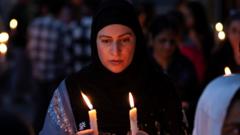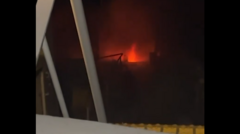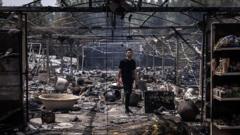Increasing clashes between armed factions and Druze fighters raise concerns about Syria's security landscape post-Assad, with international involvement and deep-rooted divisions exacerbating the situation.
Deadly Clashes in Syria's Druze Areas Highlight Fragility and Outside Influence

Deadly Clashes in Syria's Druze Areas Highlight Fragility and Outside Influence
Rising tensions threaten the stability of Syria as deadly sectarian violence breaks out in Druze regions.
Deadly confrontations have flared anew in Syria's Druze-dominated regions, north of Damascus, igniting fears of escalating unrest in a country already grappling with years of conflict. The latest violence has prompted airstrikes from Israel aimed at protecting local Druze civilians amid accusations of an "unjustifiable genocidal campaign" by outside forces, including Islamist factions and security personnel.
The upheaval comes over a decade into Syria's civil war following the ousting of Bashar al-Assad, leaving behind a complex and fractured political landscape. Areas like southern Damascus and Suweida, home to substantial Druze populations, witness unrelenting violence that has claimed over 100 lives in the current wave of clashes. Sheikh Hikmat al-Hijri, the Druze community's spiritual leader, criticized the ongoing bloodshed as forces from various factions, including those loyal to aligned groups, engaged in violent confrontations.
Despite official denials, there is a pervasive sense of mistrust toward the new authorities, arising from their radical Islamist affiliations. In March, hundreds died when security forces clashed with remaining loyalist fighters, showcasing the fragility of the situation. The Assad regime's hold appears tenuous, with multiple factions claiming territory as they vie for control in a country that has long categorized power along sectarian lines.
The Israeli government, citing humanitarian concerns, conducted airstrikes in response to threats against Druze communities, demanding Syrian authorities improve their security measures. However, the Syrian government labeled these actions as violations of sovereignty while attempting to quell local unrest.
Recent clashes were reportedly spurred by offensive remarks against Islamic figures circulating online, triggering rapid escalations in hostility. With ceasefires tentatively reached since the recent violence, many question the resilience of peace amid the backdrop of deep-rooted suspicions among ethnic and religious minorities.
Furthermore, notable geopolitical actors such as Turkey and Israel have carved out roles within this complex web of conflicts, with Turkey's endorsement of the new leadership contrasting sharply with Israel’s militaristic stance. Recent Israeli maneuvers to consolidate support from the Druze community illustrate the multifaceted international dynamics at play in Syria.
These escalating tensions between various factions—along with foreign interventions—underscore a precarious state of affairs in Syria. The road toward stability and peace will necessitate both national reconciliation efforts and substantial international assistance to secure a better future for the war-torn nation and its enduringly beleaguered citizens.


















